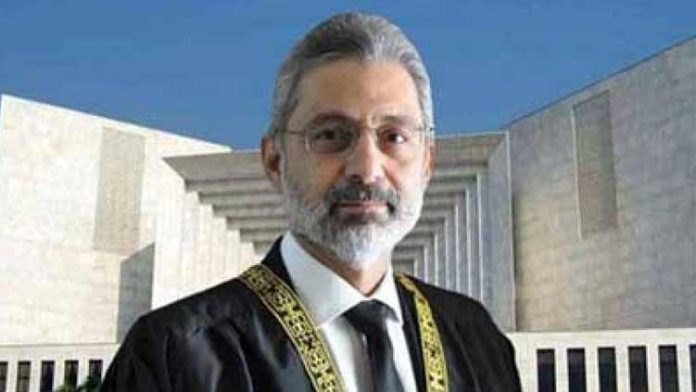Staff Report
ISLAMABAD: The inquiry commission formed by the federal government to probe audio leaks has raised objections to the constitution and composition of Chief Justice of Pakistan Umar Ata Bandial-led bench hearing a plea against it.
Earlier this month, the federal government had formed a three-member commission, headed by Jus-tice Qazi Faez Isa, to investigate the leaked audios allegedly involving the judiciary and former chief justices, saying the conversations had raised apprehensions over impartiality of judges.
Later, Supreme Court Bar Association President Abid Zuberi filed a petition against the commission, prompting the top court to halt its proceedings.
As the apex court’s five-member bench headed by CJP Bandia and comprising Justice Ijazul Ahsan, Justice Munib Akhtar, Justice Shahid Waheed and Justice Hasan Azhar Rizvi was set to hear the petition, the inquiry commission submitted its written reply objecting to the bench. The commission said it would not be appropriate for the bench to hear this petition as one of the au-dio recordings allegedly pertains to the mother-in-law of the chief justice. “Hon’ble Mr. Justice Munib Akhtar may also be mentioned in the said recording. Another audio recording reference is made to case fixation before a particular bench headed by Hon’ble Mr Justice Ijaz ul Ahsan,” reads the reply.
Citing the recently approved “The Supreme Court (Practice and Procedure) Act, 2023, it said the bench could not hear the case as the committee comprising the CJP and two most senior judges had not determined which bench should hear the petition.
“The Supreme Court Rules, 1980 (the Rules’) require that notices, prior to filing of any petition, must be sent by the petitioner/petitioner’s counsel to the respondents informing about the filing of the peti-tions, but this was not done. The Rules also require submission of an affidavit of service confirming service of notice on the respondents, and though such an affidavit was filed, service was not affect-ed. Till date the Commission has not received copies of the petitions, therefore, the Commission re-serves its right to attend to the same when and if the same are provided.”
The inquiry commission further said the petitions had been filed under Article 184(3) of the Constitu-tion but the “order of the Supreme Court dated 26 May 2023 does not mention this provision, let alone that the petitions were maintainable thereunder”. A petition under Article 184(3) can only be filed provided ‘a question of public importance with refer-ence to the enforcement of any of the Fundamental Rights’ is involved, the commission said, adding that how Mr Zuberi could represent the public interest when he was “one of the persons allegedly talking in the audio recordings”.
Concluding its reply, the commission said it had “no interest in the matter other than to undertake the assignment given to it and to do so strictly in accordance with the Constitution and the law.” The commission also assures that legal objections and concerns raised before it will be considered.




